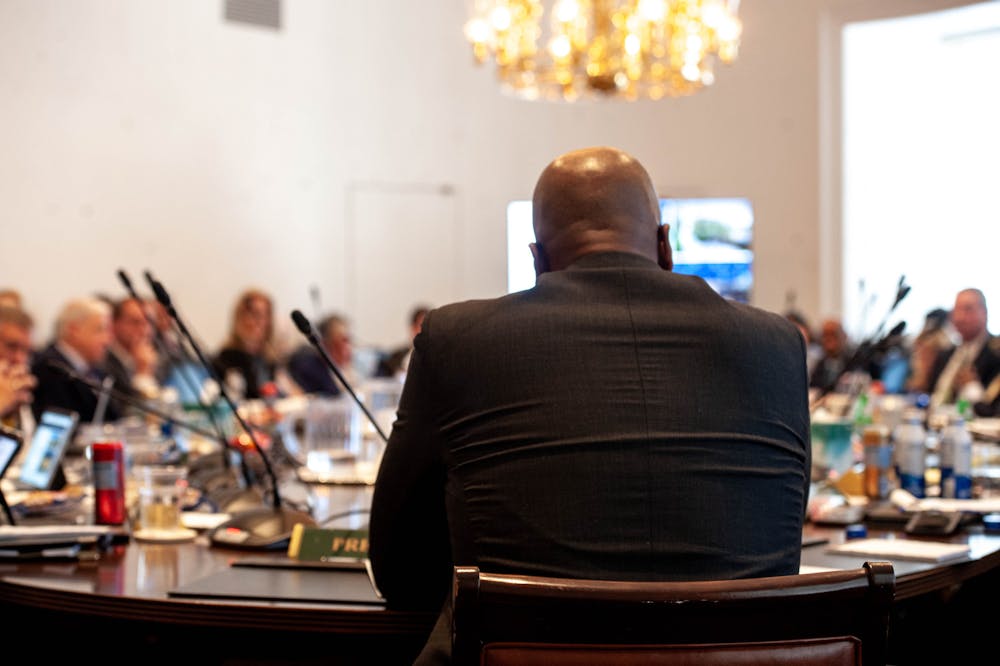The Board of Visitors’ Finance Committee met Friday to evaluate the financial feasibility of three additions to the Major Capital Plan, which outlines planned improvements to the University through construction, renovation and infrastructure projects. The newly approved projects include an upgrade to Hereford Residential College’s HVAC system, an expansion of the University Hospital’s South Tower and the construction of an Institute of Biotechnology. The Board additionally reviewed a series of proposals and updates relating to contract signatory authority, the University’s investment portfolio and future developments.
The three new projects within the Major Capital Plan, an annual set of assets evaluated to optimize the University’s financial stream, were determined to be viable additions to the MCP by the Board’s Buildings and Grounds Committee Thursday, leading to the Finance Committee’s discussion of the plan’s financial viability.
According to the Finance Committee agenda, the Committee considers potential additions to the MCP and evaluates if there is a viable financing plan that fits the estimated project costs and additional operating costs.
The new Institute of Biotechnology, which will be added on to the Fontaine Research Park complex, has an estimated cost of $350 million, with $100 million of the costs paid for by “private philanthropy” and the other $250 million added to the University’s debt, which is serviced through the University’s operating funds, Commonwealth funds, administrative costs and potential donations.
According to the discussion section of the Committee’s agenda, the institute aligns with health equality goals and provides a wide range of opportunities for research across fields ranging from neuroscience to cardiovascular disease.
“The ultimate outcome is to ensure that no Virginian needs to leave the Commonwealth to obtain high-quality health care,” the section reads. “The Institute of Biotechnology building … will provide modern, flexible laboratory space to accommodate a wide range of disciplines.”
The University’s Medical Center would cover the $120 million expansion of the Hospital’s South Tower with both operational funds and cash. This expansion would create three floors of additional beds to meet increased demand for adult and infant intensive care units and oncology services, according to the Committee’s agenda.
Hereford Residential College’s new $11.4 million HVAC system is the only new proposed item on the MCP that would be entirely paid in cash.
The agenda’s discussion emphasized the development’s importance to the 2030 Plan, a comprehensive vision for the University’s development outlined by President Jim Ryan.
“Aligned with the 2030 Plan, this project will enhance the student experience by
improving the quality of residential living,” the discussion section reads. “In addition, the project will increase overall building efficiency and extend the useful life of these facilities.”
The Committee also approved several requests for proposals. Guidelines dictate that the committee must review any RFPs exceeding $5 million per year. During the session, RFPs for increasing the amount of custodial staff and acquiring new technologies including desktops, tablets and laptops were approved. Additionally, the Committee authorized the reduction of tuition at the College at Wise Center for Teaching Excellence with the intention to increase the program’s affordability and competitiveness.
The Committee also reviewed a series of current and potential affordable housing investments across the Charlottesville area. Committee members Jim Murray and Carlos Brown sit as Board representatives on an affordable housing advisory group that has identified three sites for future development of affordable housing.
Finally, the Committee reviewed a series of both recently completed and currently ongoing efforts to evaluate the success of the University’s use of budgetary spending. These Operational Efficiency and Effectiveness Efforts relied upon several studies and consultations that used data surrounding accounting, financial reporting and cost efficiency in order to better understand how to guide the budget through potential new issues, proposals and requests.
According to a presentation delivered by Jennifer Davis, the University’s executive vice president and chief operating officer, the effort to advance understanding of the University’s best financial interests will continue as part of the Board’s series of next steps spanning from March to June. These steps will also include the finalization of the 2025 fiscal year operating budget.
The Finance Committee is scheduled to reconvene when the Board meets again in June.







